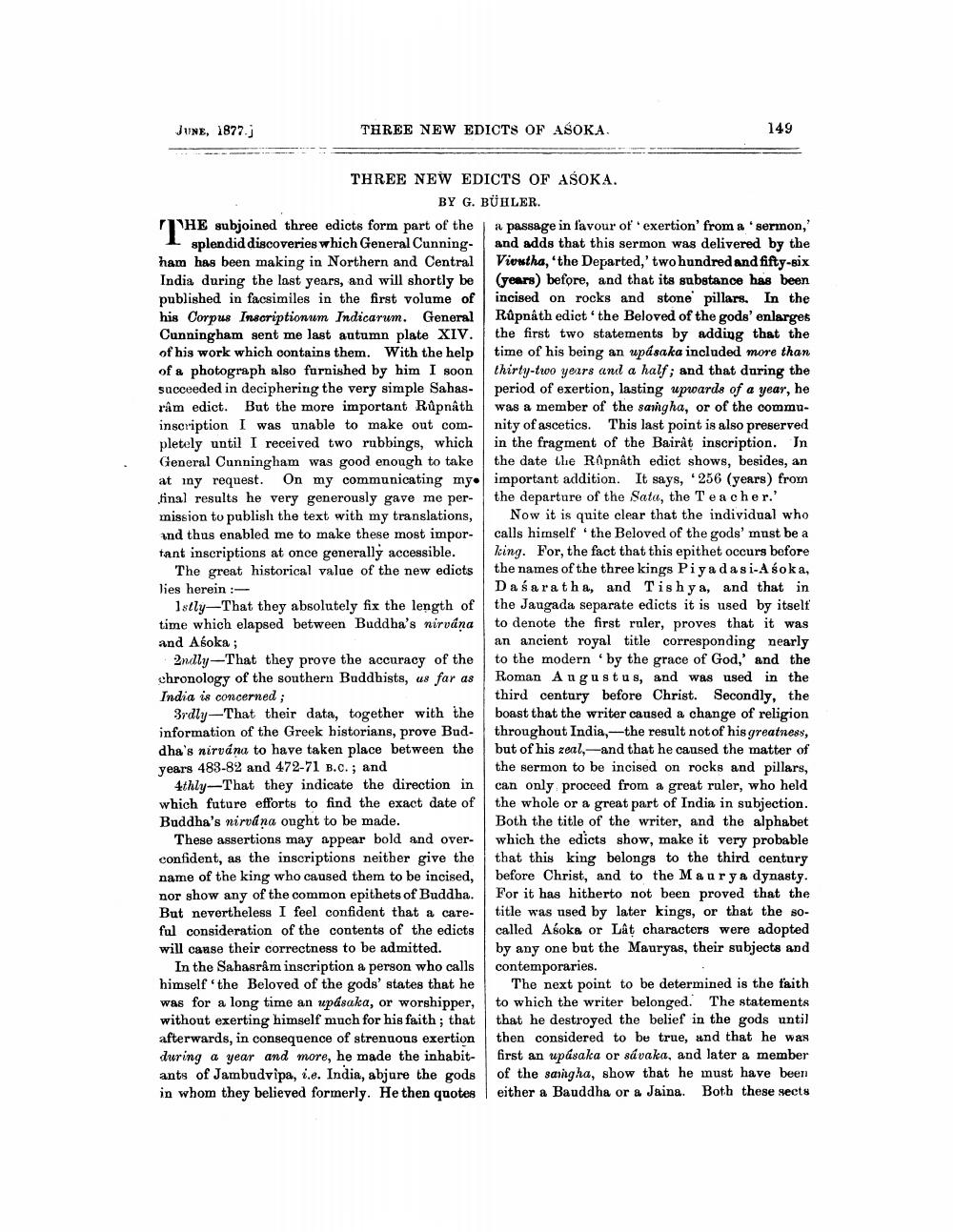________________
JUNE, 1877.j
THREE NEW EDICTS OF ASOKA.
149
THREE NEW EDICTS OF ASOKA.
BY G. BÜHLER. T HE subjoined three edicts form part of the a passage in favour of exertion' from a sermon,
1 splendid discoveries which General Cunning and adds that this sermon was delivered by the ham has been making in Northern and Central Vivutha, 'the Departed,' two hundred and fifty-six India during the last years, and will shortly be (years) before, and that its substance has been published in facsimiles in the first volume of incised on rocks and stone pillars. In the his Corpus Inscriptionum Indicarum. General Rûpnáth edict the Beloved of the gods' enlarge Cunningham sent me last autumn plate XIV. the first two statements by adding that the of his work which contains them. With the help time of his being an upásaka included more than of a photograph also furnished by him I soon thirty-two yerrs and a half; and that during the succeeded in deciphering the very simple Sahas- | period of exertion, lasting upwards of a year, he râm edict. But the more important Rûpnath was a member of the samgha, or of the commuinscription I was unable to make out com- nity of ascetics. This last point is also preserved pletely until I received two rubbings, which in the fragment of the Bairåt inscription. In General Cunningham was good enough to take the date the Rapnath edict shows, besides, an at iny request. On my communicating my important addition. It says, 256 (years) from tinal results he very generously gave me per- the departure of the Sata, the Teacher.' mission to publish the text with my translations, Now it is quite clear that the individual who and thus enabled me to make these most impor- calls himself the Beloved of the gods' must be a tant inscriptions at once generally accessible. kring. For, the fact that this epithet occurs before
The great historical value of the new edicts the names of the three kings Piyadasi-Asoka, lies herein :
Dasaratha, and Tish ya, and that in 1stly-That they absolutely fix the length of the Jaugada separate edicts it is used by itselt time which elapsed between Buddha's nirvana to denote the first ruler, proves that it was and Asoka ;
an ancient royal title corresponding nearly 2ndly-That they prove the accuracy of the to the modern by the grace of God,' and the chronology of the southern Buddhists, us far as Roman Augustus, and was used in the India is concerned ;
third century before Christ. Secondly, the 3rdly-That their data, together with the boast that the writer caused a change of religion information of the Greek historians, prove Bud- throughout India, the result not of his greatness, dha's nirvana to have taken place between the but of his zeal, and that he caused the matter of years 483-82 and 472-71 B.C.; and
the sermon to be incised on rocks and pillars, 4thly-That they indicate the direction in can only proceed from a great ruler, who held which future efforts to find the exact date of the whole or a great part of India in subjection. Buddha's nirvana ought to be made.
Both the title of the writer, and the alphabet These assertions may appear bold and over- which the edicts show, make it very probable confident, as the inscriptions neither give the that this king belongs to the third century name of the king who caused them to be incised, before Christ, and to the Maury a dynasty. nor show any of the common epithets of Buddha. For it has hitherto not been proved that the But nevertheless I feel confident that a care- title was used by later kings, or that the soful consideration of the contents of the edicts called Asoka or Lật characters were adopted will cause their correctness to be admitted. by any one but the Mauryas, their subjects and
In the Sahasråm inscription a person who calls contemporaries. himself 'the Beloved of the gods' states that he The next point to be determined is the faith was for a long time an upásaka, or worshipper, to which the writer belonged. The statements without exerting himself much for his faith ; that that he destroyed the belief in the gods until afterwards, in consequence of strenuous exertion then considered to be true, and that he was during a year and more, he made the inhabit- first an upusaka or savaka, and later a member ants of Jambudvipa, i.e. India, abjure the gods of the saingha, show that he must have been in whom they believed formerly. He then quotes either a Bauddha or a Jaina. Both these sects




